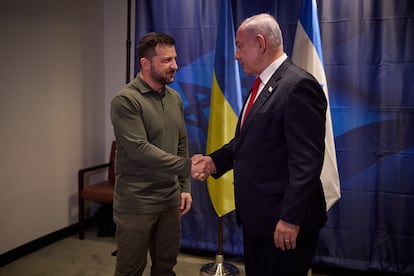Ukraine seeks to win over Israel as an ally against Russia
Zelenskiy has offered unconditional support to Netanyahu and is focusing on a communication strategy that links Moscow to Hamas

There are few Jewish leaders in the world outside of Israel. One of them is Volodymyr Zelenskiy, the president of Ukraine. He is not a practicing Jew and in an interview in 2019, shortly before being elected to office, he stated: “The fact that I am a Jew is about the 20th question among my characteristics.” But Zelenskiy has pointed to his “Jewish blood” as an example of Ukrainian diversity. Despite this, Ukraine’s relationship with the Israeli government has gone from bad to worse, marked by the ambivalence of Israeli Prime Minister Benjamin Netanyahu in the face of the Russian invasion. Kyiv believes that the Hamas terrorist attacks in Israel can reverse the situation and help it gain a powerful ally.
Zelenskiy has shared his unconditional support for Israel, and its military response in Gaza, which he considers legitimate defense. In an appearance on October 11 at NATO headquarters, the Ukrainian president said that Western democracies should support the Israeli military response in Gaza and not advocate negotiated solutions. “Sometimes we are thinking how to prevail or how to stop the war, how to manage something, dialogue with Iran or Russia. We have to think opposite,” Zelenskiy said. “We have to not give the possibility for aggressors even to think about the third world war, the new wave of aggression, the new big tragedy.”
On October 19, in his last public speech on the conflict in the Middle East, Zelenskiy opted for more nuance. His words came a few hours after a telephone call with U.S. President Joe Biden: “Ukrainians and Americans sympathize with all the victims of these tragic events. Ukraine is ready to work together with America and all partners to stabilize the situation and save as many lives as possible.”
Oleksiy Melnyk, co-director of the Razumkov Center, a Ukrainian research institution in international and security policy, told EL PAÍS by phone that it was still early to talk about Zelenskiy’s strategy, especially since the position of Israel’s Western allies may change given the high number of civilian victims in Gaza. “What is certain,” Melnik points out, “is that there is a willingness to take advantage of the situation to turn around bilateral relations that until October 7 [when Hamas carried out its terrorist attacks] were tense and full of misunderstandings.”
Multiple issues have caused tension, but the main one is Israel’s conciliatory approach to Russia. While Israel condemned the invasion of Ukraine, it has refused to support Western sanctions against Russia and has not provided Kyiv with any weapons. There are two compelling reasons that justify the position of the Netanyahu government. Firstly, 30% of Israelis are of Russian origin, according to the Statistics Office of Israel. And secondly, Moscow has maintained control over Syrian airspace since its intervention in support of the dictator Bashar al-Assad in the civil war that has divided the country. Russia’s military dominance in most of Syria has allowed Israel to bomb Syrian military positions or those of groups affiliated with Iran. And this despite the fact that Iran, which in turn supports Syria, is one of Russia’s main international backers.
The misunderstandings between the Ukrainian and Israeli governments have been constant. Israeli Foreign Minister Eli Cohen visited Kyiv in February 2023 and caused controversy after he expressly refused, when asked, to name Russian troops as perpetrators of war crimes in the north of the Ukrainian capital. Israeli and U.S. media reported this past week that Zelenskiy requested to visit Israel to show solidarity with Netanyahu, but the Israeli government rejected the offer, claiming that “now is not the time.”
Diplomatic conflicts have occurred in other areas. Ukraine has protested the deportations of Ukrainian refugees in Israel, who are not granted special visas. Kyiv even threatened to ban the thousands of Jewish pilgrims who annually visit the tombs of Hasidic masters, such as Rabbi Nachman of Breslov, from entering the country. The fact that the anti-Semitic far-right of World War II are remembered in Ukraine as national heroes is also a recurring source of Israeli protests. In fact, among the stalls of the busiest tourist spots in Kyiv, it is easy to find nationalist badges with fascist and even Nazi paraphernalia.
Russia, the common enemy
Kyiv is focusing its effort with Israel on underlining that Russia, as well as Iran, is behind Hamas. Iran has provided Moscow with components for its arms industry, in particular the Shahed drones, which Russia uses daily to target military objectives and Ukrainian cities. Kyrylo Budanov, the head of the Ukrainian Defense Ministry’s intelligence services, told Pravda newspaper on October 12 that he had evidence that Moscow had sent Hamas weapons captured in Ukraine.
Mykhailo Podolyak, Zelenskiy’s advisor, has accused Russia of being a “sponsor of global terrorism.” And Oleksiy Danilov, secretary of Ukraine’s National Security Council, stated in an article published in Pravda on October 9 that Russia leads “a global axis of evil.” “Russia, due to its inherent darkness and savagery, has become the benchmark for countries committed to authoritarian revenge, which is why it must suffer an exemplary punishment and must be defeated in a way that deters others who want to challenge democracy,” he wrote.
Russia has been noted for its harsh criticism of the Israeli bombings in Gaza. It has also accused Israel of “violating international law” with the October 12 bombings against the Syrian airports in Damascus and Aleppo. “This shows that all of Netanyahu’s attempts to reach an understanding with Russia have been useless,” says Melnik.
There is one more reason for Ukraine to support a quick resolution of the conflict in Gaza: the fear that a prolonged escalation will force the United States to allocate weapons to Israel that could have been sent to Ukraine to combat the Russian invasion. Biden has brought to Congress an unprecedented budget to arm Ukraine and Israel, but the U.S. arms industry is working at top speed, and is still not able to cover all the projectiles needed on the Ukrainian war front. If the White House decides to prioritize support for Israel, Ukraine will lose ground and with it, its chances of recovering territory from Russia before winter.
Sign up for our weekly newsletter to get more English-language news coverage from EL PAÍS USA Edition
Tu suscripción se está usando en otro dispositivo
¿Quieres añadir otro usuario a tu suscripción?
Si continúas leyendo en este dispositivo, no se podrá leer en el otro.
FlechaTu suscripción se está usando en otro dispositivo y solo puedes acceder a EL PAÍS desde un dispositivo a la vez.
Si quieres compartir tu cuenta, cambia tu suscripción a la modalidad Premium, así podrás añadir otro usuario. Cada uno accederá con su propia cuenta de email, lo que os permitirá personalizar vuestra experiencia en EL PAÍS.
¿Tienes una suscripción de empresa? Accede aquí para contratar más cuentas.
En el caso de no saber quién está usando tu cuenta, te recomendamos cambiar tu contraseña aquí.
Si decides continuar compartiendo tu cuenta, este mensaje se mostrará en tu dispositivo y en el de la otra persona que está usando tu cuenta de forma indefinida, afectando a tu experiencia de lectura. Puedes consultar aquí los términos y condiciones de la suscripción digital.









































